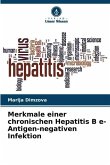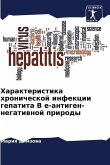The Republic of North Macedonia belongs to the countries with an intermediate prevalence of chronic hepatitis B virus infection. The introduction of hepatitis B vaccination into the routine vaccination calendar in 2004 has not yet shown its effects on the general population which would typically manifest as a decrease in the incidence and prevalence of HBV infection. In the Republic of North Macedonia, the HBeAg-negative form of CHB predominates. Chronic HBV infection is a dynamic process influenced by the interplay between HBV replication and the host's immune response. Due to these dynamics and the evolving nature of HBV infection, not all patients with chronic HBV infection also develop chronic hepatitis. This gives rise to the challenge of diagnosing, monitoring, and treating chronic hepatitis B patients, as well as managing associated complications such as cirrhosis, decompensated liver disease, HCC, and preventing death. There is a need to define the phases of chronic hepatitis B virus infection and evaluate the clinical, laboratory-biochemical, serological, and virological characteristics, as well as their interrelationships in patients with chronic hepatitis B.
Bitte wählen Sie Ihr Anliegen aus.
Rechnungen
Retourenschein anfordern
Bestellstatus
Storno








